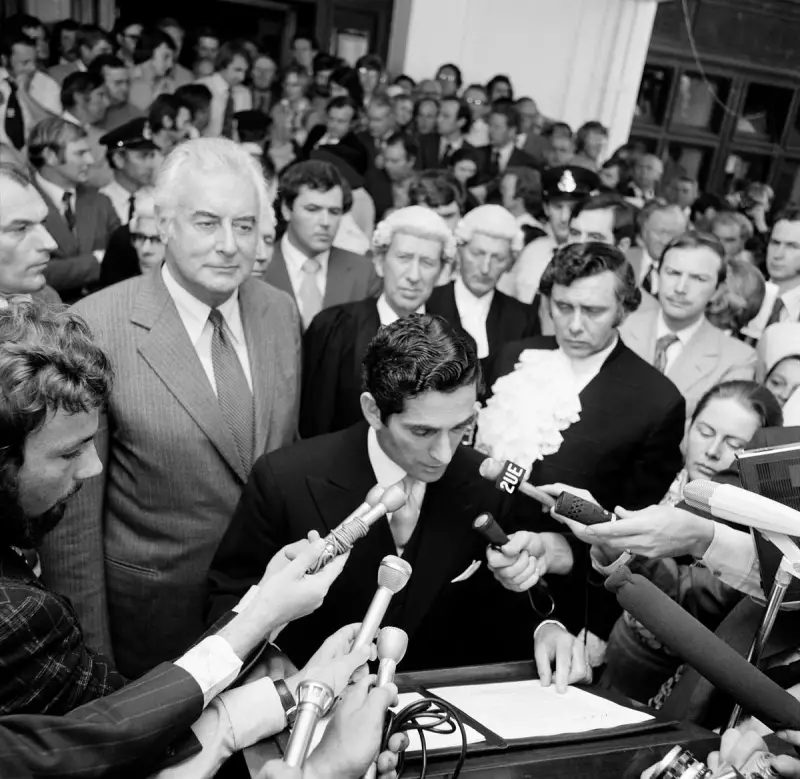
The Day Australia Held Its Breath
At 4.40pm on November 11, 1975, Australian political history changed forever. A massive crowd had gathered outside Parliament House in Canberra, sensing the climax of the nation's most severe constitutional crisis. Standing tall on the front steps, Gough Whitlam, moments after being dismissed as prime minister by Governor-General Sir John Kerr, prepared to deliver what would become his most iconic speech.
With his commanding baritone voice filled with indignation, Whitlam declared to the cheering crowd: "Well may we say, 'God Save The Queen', because nothing will save the Governor-General." The crowd's roar echoed the former PM's fury toward what Australians would forever remember as "the dismissal".
The Road to Constitutional Crisis
Whitlam's dramatic downfall didn't begin on that tumultuous afternoon. Three years earlier, he had been riding a wave of popularity, leading Labor to victory in the 1972 election and ending 23 years of Coalition government.
During his prime ministership, Whitlam's government introduced groundbreaking social reforms that continue to shape Australia today. These landmark achievements included:
- Ending conscription for the Vietnam War
- Establishing Medibank, which later became Medicare
- Abolishing university fees
- Creating the Department of Aboriginal Affairs
- Introducing no-fault divorce
Despite these social policy successes, the Whitlam government struggled significantly with economic management. The 1973 oil crisis struck just months after Labor took office, plunging Australia into a recession that saw inflation skyrocket above 17 percent.
Political challenges mounted when Whitlam faced deadlock in the Senate over supply bills. Although he survived a double dissolution election in May 1974, the government's position continued to deteriorate.
The Unravelling Begins
The Whitlam government's troubles deepened with what became known as the Loans Affair scandal. Cabinet ministers, including Whitlam himself, had authorised Energy Minister Rex Connor to attempt borrowing billions of dollars through Pakistani banker Tirath Khemlani. When this secret arrangement came to light, it forced the removal of both Connor and Deputy Prime Minister Jim Cairns from the ministry.
Another critical turning point came with the death of Queensland Senator Bertie Milliner. The responsibility for replacing him fell to the Queensland Parliament, where Premier Sir Joh Bjelke-Petersen, a fierce Whitlam opponent, held power. Against Whitlam's wishes, the little-known Albert Field was appointed to fill the vacant seat.
This appointment proved crucial—it gave the Coalition the balance of power in the Senate. In an unprecedented move that went against convention, Liberal leader Malcolm Fraser took the extraordinary step of withholding supply for the government, effectively denying Whitlam the money needed to govern and pushing Australia toward a US-style government shutdown.
The Final Confrontation
With Parliament completely deadlocked, Whitlam went to Government House at Yarralumla to meet Governor-General Sir John Kerr. The Prime Minister intended to request a half-Senate election to break the impasse, but Kerr first asked Whitlam if he planned to govern without supply.
When Whitlam confirmed he would, Kerr handed him a letter that would change Australian politics forever—the PM and his government were dismissed. "We will both have to live with this," Kerr told him. Whitlam's chilling reply: "You certainly will."
The Governor-General then met with Fraser, who agreed to form a caretaker government and was sworn in as prime minister. Outside Parliament House, Whitlam delivered his iconic speech, while inside, the supply bills finally passed for Fraser, allowing government operations to resume.
Legacy of the Dismissal
A month later, Australians voted in another double dissolution election to resolve the constitutional crisis. The Coalition achieved a record victory, winning 55 more seats than Labor. Although Whitlam remained as Labor leader, he never returned to the Lodge, while Fraser served as prime minister until 1983.
Remarkably, the two former opponents became surprisingly good friends in their later years, putting their historic conflict behind them.
The dismissal remains extremely controversial fifty years later. Scholars continue to debate whether Kerr should have sought approval from the Queen and whether better alternatives existed to resolve the crisis. Online, conspiracy theories abound regarding Kerr's connections to the CIA and whether the dismissal was motivated by American interests in protecting the Pine Gap facility.
Today, the Governor-General retains the same powers exercised by Sir John Kerr in 1975. While Australia has thankfully moved far from the political crisis that gripped the nation in the mid-1970s, the constitutional mechanisms that enabled the dismissal remain in place, leaving open the possibility of similar conflicts should future Senate deadlocks occur.





